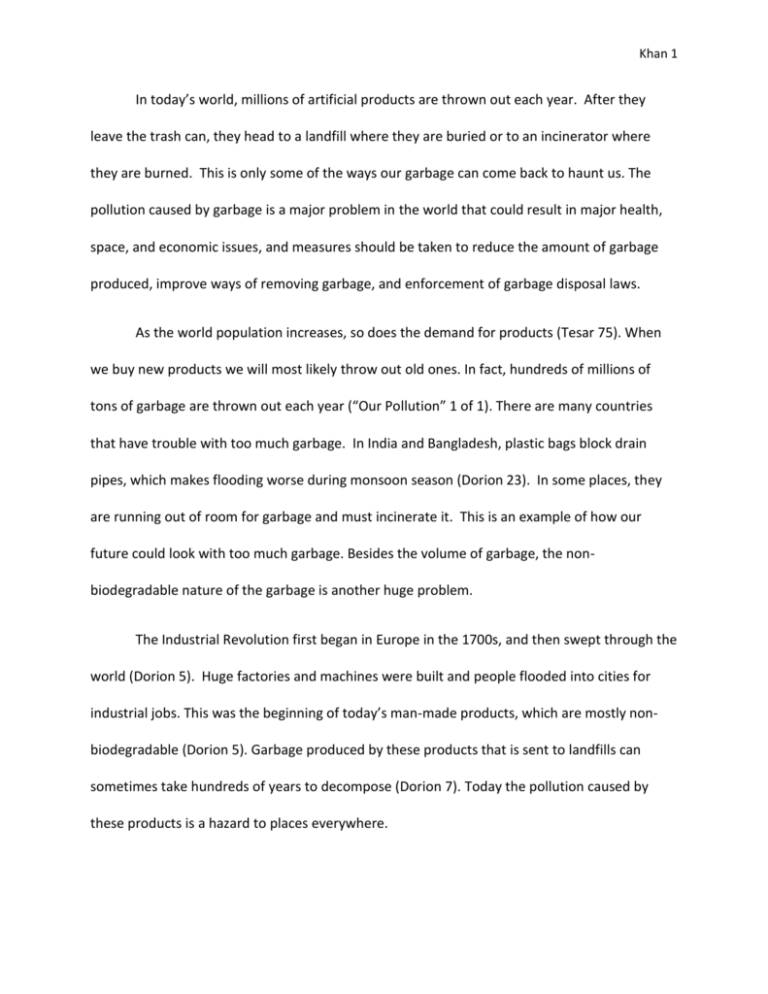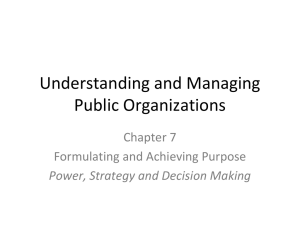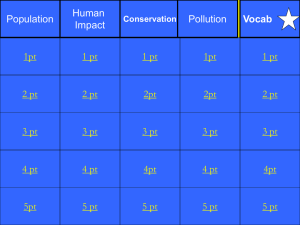Essay - The Problem of Garbage Pollution
advertisement

Khan 1 In today’s world, millions of artificial products are thrown out each year. After they leave the trash can, they head to a landfill where they are buried or to an incinerator where they are burned. This is only some of the ways our garbage can come back to haunt us. The pollution caused by garbage is a major problem in the world that could result in major health, space, and economic issues, and measures should be taken to reduce the amount of garbage produced, improve ways of removing garbage, and enforcement of garbage disposal laws. As the world population increases, so does the demand for products (Tesar 75). When we buy new products we will most likely throw out old ones. In fact, hundreds of millions of tons of garbage are thrown out each year (“Our Pollution” 1 of 1). There are many countries that have trouble with too much garbage. In India and Bangladesh, plastic bags block drain pipes, which makes flooding worse during monsoon season (Dorion 23). In some places, they are running out of room for garbage and must incinerate it. This is an example of how our future could look with too much garbage. Besides the volume of garbage, the nonbiodegradable nature of the garbage is another huge problem. The Industrial Revolution first began in Europe in the 1700s, and then swept through the world (Dorion 5). Huge factories and machines were built and people flooded into cities for industrial jobs. This was the beginning of today’s man-made products, which are mostly nonbiodegradable (Dorion 5). Garbage produced by these products that is sent to landfills can sometimes take hundreds of years to decompose (Dorion 7). Today the pollution caused by these products is a hazard to places everywhere. Khan 2 People are disposing of garbage in harmful ways. Garbage is sometimes sent to other countries, where native people must dispose of it (Jing 3 of 7). Some places dump their waste into oceans (Jing 2 of 7). When the garbage is dumped into oceans, the water is polluted and kills many marine animals (Tesar 73). As a result the fishing industry is declining and beaches are becoming hazardous for swimmers and boaters. Garbage is also dumped in lakes and rivers from where people get their drinking water. People get sick from diseases such as typhoid and dysentery. While sifting through garbage to sell useful items, they catch illnesses from it because they have no sanitation equipment (Jing 7 of 7). In fact, over five million people die from sickness each year from garbage pollution (Dorion 29). If this problem was solved, then we would not have as many people dying of garbage pollution. Laws have been passed to limit hazardous ways of garbage disposal. But in many countries these laws are not enforced seriously and people and industries continue to dump their wastes illegally (Tesar 73). If these laws were implemented, waterways would be clean and people would not get sick. Today, many governments and organizations are trying to clean up the environment. Agenda 21 was adopted by many countries in 1992. It is a clean up plan that encourages people to reduce, reuse, and recycle. More and more people are using reusable bags and containers and long life bulbs and tires. Recycled aluminum cans and glass are made into new products. Companies are looking into ways to use recyclable materials and reduce the weight and volume of packaging. Offices are recycling paper, saving trees and money. Manufacturers are instituting waste reduction changes, reducing not only trash, but saving in waste disposal costs. Khan 3 Today garbage pollution is a major problem for people’s health and the world economy, and increasing volumes of garbage is shrinking precious living space. Work should be done to reduce and remove garbage, and enforce garbage removal laws. Governments, industries, organizations and individuals need to come together urgently to stop this mounting crisis and save Mother Earth. Khan 4 Works Cited Dorion, Christiane. What if we do nothing? Earth’s Garbage Crisis. Pleasantville: Gareth Stevens Publishing, 2007. Hirshmann, Kris. Pollution. Detroit: Kidhaven Press, 2005. Jing, Li. “Garbage in, Pollution out”. China Daily. China Daily. 18 Mar. 2010. 15 Nov. 2010. <http://www.chinadaily.com.cn/china/2010-03/18/content_96059997.htm> “Our Pollution”. Environmental Facts-Pollution. 21 Nov. 2010. <http://www.greennetworld.com/facts/pollution.htm> Tesar, Jenny. Our Fragile Planet: The Waste Crisis. New York: Facts on File, Inc., 1991.






